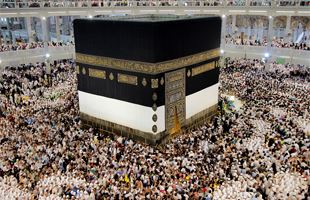 18 August 2018 – As the number of pilgrims participating in the annual hajj has been increasing in recent years, WHO has been providing support to Saudi Arabia to ensure implementation for the first time during the hajj season of an early warning surveillance system to prevent, early detect, and respond to public health threats during the hajj.
18 August 2018 – As the number of pilgrims participating in the annual hajj has been increasing in recent years, WHO has been providing support to Saudi Arabia to ensure implementation for the first time during the hajj season of an early warning surveillance system to prevent, early detect, and respond to public health threats during the hajj.
The development of the electronic early warning surveillance system is a joint effort between Saudi Arabia’s Ministry of Health and WHO’s Regional Office for the Eastern Mediterranean. This is the first year in which the new system will be used during the hajj and it’s being piloted in 8 hospitals and 25 primary health care facilities in Mina and Muzdalifah. Ministry of Health and WHO technical teams are actively participating in the implementation and monitoring of the new surveillance system.
The Ministry of Health of Saudi Arabia has previously relied on different surveillance methods during the hajj season to ensure early detection of public health threats, however, the new system is using syndromic and event-based surveillance to detect potential health threats. The new surveillance system has been integrated with existing reporting systems to address public health threats like acute febrile illness, diarrhoea, respiratory infections, haemorrhagic fever, neurological manifestations, food poisoning, heat-related illness and unusual events. Health authorities will be alerted to any threats that could lead to a disease outbreak or public health emergency and have implemented effective measures to reduce adverse health outcomes. The system is linked to a general public health command control centre which mobilizes the rapid response teams for timely verification and response to any public health threat.
Over 30 000 Saudi health workers will continue to provide support to pilgrims at 25 hospitals and 155 primary health care centres around the holy sites where as many as 2 million Muslims from about 160 countries have begun their pilgrimage in Saudi Arabia this week.
WHO has been providing technical support and advice to the Ministry in their preparations for and response to any possible health event that might occur during one of the world’s largest annual religious gatherings.
The hajj authorities have adopted the slogan “Hajj with Health” reflecting the importance assigned by Saudi Arabia to increasing health awareness among all pilgrims. To improve communication and ensure that health messages reach all hajjis the Ministry of Health and local nongovernmental organizations are providing health information in 67 languages to facilitate an exchange of information between health staff and the public on medical histories and symptoms of any patients experiencing illness during the hajj.





